Your cart is currently empty!
Blog
-
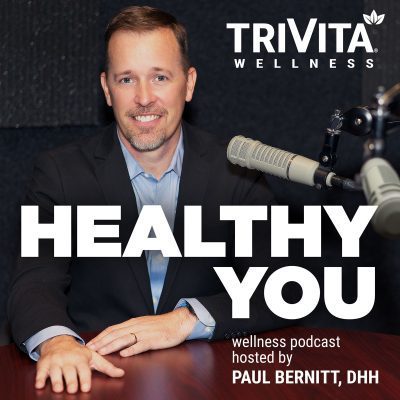
Episode 58: It’s That Time of Year to Support Your Immune System
Join us as Dr. Paul Bernitt DHH, talks about the immune system and the digestive system and how they help us fight off colds, flu and viruses.
Awareness is the key to change. Do you know what a cytokine storm is? Or, that the majority of your immune system is in your gut or, the difference between the innate immune system and the adaptive immune system?
On this episode of Healthy You, Dr. Paul shares plenty of great information about healthy lifestyle tips and TriVita products that can help you be ready for cold and flu season. Listen in for information to protect your health and wellness.
About Paul Bernitt, DHH

Paul Bernitt is a Board-Certified Doctor of Holistic Health by the American Naturopathic Medical Certification Board. He is also a Master Herbalist, a Holistic Wellness Practitioner, Doctor of Divinity, and has a degree in Mind-Body Transformational Psychology. Additionally, Paul is certified in Clinical Hypnotherapy, Holistic Nutrition, Bioenergetics, and Life Coaching.
Paul’s mission is to end as much needless suffering as possible by helping people discover hope, health, and healing. He has helped thousands of people experience the value of optimal health and wellness so they can live their purpose with greater energy, vitality, and quality of life mentally, physically, spiritually, emotionally, and environmentally.
-

The Anti-Inflammatory Effects of Resveratrol
We know trans-resveratrol is a multi-tasker and helps our bodies in several ways. But most people are unaware of how much resveratrol helps as an anti-inflammatory.
Studies over the past years have focused on foods rich in polyphenols with anti-inflammatory and immunomodulatory properties since inflammation was recognized to play a central role in several diseases. These studies show the beneficial effects of resveratrol, the most widely investigated polyphenol, on cancer and neurodegenerative, respiratory, metabolic and cardiovascular diseases. Resveratrol has been shown to modulate the inflammatory pathways underlying those diseases, and there are future opportunities for the evaluation of its clinical viability.
Resveratrol has antioxidant and anti-inflammatory properties to protect you against diseases like cancer, diabetes and Alzheimer’s disease. The anti-inflammatory effects of resveratrol make it a good remedy for arthritis and skin inflammation. Also, resveratrol has antibacterial and antifungal properties that help treat infections of the urinary and digestive tracts.

Many researchers have concluded that resveratrol is a valuable micronutrient that can prevent heart disease in those at risk and help treat people with progressing cardiovascular conditions. Many studies indicate that resveratrol could help prevent and treat certain types of cancer. Its anti-tumor effects include inhibiting cancer cell growth, cell signaling, angiogenesis, and promoting cell death
There is plenty of science that shows trans-resveratrol as an effective anti-inflammatory along with its help in promoting brain health, heart health and as an antiviral. In fact, all of this works together to help with overall wellness.
References:
1. https://www.ncbi.nlm.nih.gov/pmc/articles/PMC6032205/
2. https://www.webmd.com/diet/health-benefits-resveratrol#1 -

What's an Omega-3 Index And Why is it Important to Your Health?
Omega-3 fatty acids are essential and required for human life. While many know the importance of omega fatty acids as part of a healthy lifestyle, it hasn’t been clear how low amounts of fatty acids in the blood are also linked to all types of death including heart disease and cancer until now.
A recent analysis consisting of 17 perspective studies and consisting of more than 40,000 participants over 16 years has shown a 15-18% lowered risk of all causes of death based on higher polyunsaturated fatty acids (PUFAs) in the blood. It is important to detect early signs of omega-fatty acid deficiencies for supplement therapy to aid in reducing the incidence of disease and risk of premature death.
While the analysis does not show how polyunsaturated fatty acids (PUFAs) were consumed by each participant, it’s important to recognize the best sources. The best sources of PUFAs are found in sea life, mostly cold-water fish. Fish have the highest concentrations of PUFA’s as well as the best ratio of omega-3 EPA and DHA which reduces chronic inflammation—the root cause of most diseases.
Omega-3 fatty acids 3, 6 and 9 also contribute to multiple biological roles, such as influencing inflammation, reducing oxidative stress and presenting neuroprotection and cardiovascular protection. There are 100 billion neurons that make up your brain consisting of 60% PUFAs, and every cell in the human body has a cell membrane made of PUFAs. We are made entirely out of cells and cellular performance is key to maintaining optimal health.
Quality fish oil supplements have an excellent ratio of omega-3 EPA and DHA and come without the harmful toxins such as mercury found in fish. A study in the UK shows taking fish oil supplements lowers the risk of cardiovascular and all diseases across 427,000 participants. “The Heart and Soul” study shows that lower levels of whole blood EPA and DHA levels are associated with all causes of mortality and an accelerated rate of telomere shortening over a 5-year period. Accelerated telomere shortening is associated with a shorter lifespan.
We’re all looking for the lifestyle improvements we can make to not only maintain but improve our health outcomes. According to this analysis, we can live a longer, fuller life with less disease by managing the omega-3 levels in our blood. Because omega-3s have a powerful influence on the health of every cell we have, we can expect to have more energy, vitality, and quality of life to continue to do the things we love longer.

References:
1. https://www.nutraceuticalsworld.com/contents/view_breaking-news/2021-04-23/study-finds-omega-3-index-is-strong-risk-predictor-of-premature-death
2. https://pubmed.ncbi.nlm.nih.gov/12442909/
3. https://pubmed.ncbi.nlm.nih.gov/32131999/
4. https://www.ncbi.nlm.nih.gov/pmc/articles/PMC3058601/ -

Conquer Chronic Inflammation At The Source
Chronic inflammatory-related diseases are the most significant cause of death in the world today. While this is a startling statistic, you don’t have to suffer. There are many critical lifestyle-related changes you can quickly and easily implement to help reduce the harmful effects of chronic inflammation on your body. Among these are a healthy diet, regular exercise and anti-inflammatory supplements in your daily routine.
TriVita’s Anti-Inflammatory Wellness Regimen includes three science-backed supplements that have been shown to reduce some of the damaging causes and effects of chronic inflammation on the body.
Nopalea, Trans-Resveratrol and Omega3 Prime are a triple threat!

Nopalea benefits:
1. Lowers elevated, at-risk levels of C-reactive protein, a marker for inflammation
2. Improves joint mobility, range of motion and flexibility in the neck, back and joints
3. Less reliance on pain medication
Trans-Resveratrol benefits:
1. Helps with blood flow by keeping arteries and veins open to promote a well-functioning cardio system and healthy blood pressure
2. Helpful as an anti-viral and has shown a capacity to control fungal, bacterial and viral infections
3. A multi-tasker, helping with heart health, brain health, anti-viral, anti-aging and more, to help maintain optimal health and longevity
Omega3 Prime benefits:
1. Anti-inflammatory properties help to relieve joint discomfort and reduce symptoms associated with inflammation
2. Supports healthy blood pressure and reduces the risk of heart problems
3. Protects against cognitive declineChronic inflammation is a real, modern-world problem. Give yourself the best chance of conquering the chronic inflammation raging inside your body. The science and education about TriVita’s products are available to help you on your wellness journey!
References:
1. https://www.ncbi.nlm.nih.gov/books/NBK493173/
2. https://www.scripps.org/news_items/4232-six-keys-to-reducing-inflammation
3. https://www.ncbi.nlm.nih.gov/pmc/articles/PMC7734066/
4. https://pubmed.ncbi.nlm.nih.gov/28900017/
5. https://www.ncbi.nlm.nih.gov/pmc/articles/PMC7139620/ -
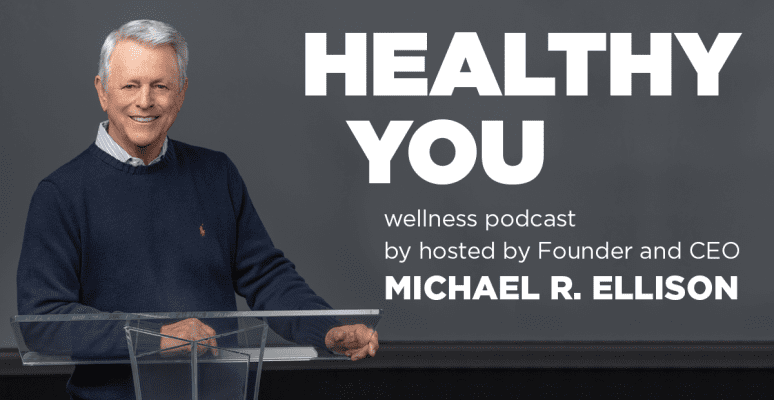
Episode 57: Living Your Best Life with Wellness and Purpose
Listen as Michael explores the ways in which living your best life with wellness and purpose is a gift that every person has, at any age or any stage of their life!
Look at the power of purpose and wellness in your life. Your purpose is within you. But there is a caveat to this, don’t let the “thief” of inflammation steal your life, your purpose or your wellness from you.
Want to be inspired? Michael shares stories from his 8-year-old granddaughter and 93-year-old father that will bring a smile to your face and a vision for you to find purpose and wellness in your life.On this episode of Healthy You, Michael shares his own story of his journey of purpose living the best life. He wants you to live your best life of purpose with wellness. Plus, learn about a free gift from Harvard Medical School about chronic inflammation that can help you become more aware of this thief and how you can help yourself.
About Michael R. Ellison, TriVita Founder & CEO

Michael Ellison has a mission to help people everywhere experience whole-person wellness. For him, this mission became crystal clear when he suffered a health crisis at the age of 50.
As Michael recovered and found his way back to health, he became determined to share his message of wellness with others. This led to his founding of TriVita in 1999, where he now leads the company’s ongoing pursuit of bringing health and wellness to the world.
Helping people experience greater wellness and mitigate the unwanted, unnecessary lifestyle-related diseases continue to be Michael’s purpose… and he brings this passion to the table in the day-to-day operations at TriVita.
Michael Ellison is also the author of 10 Habits of Wellness and founder of House of Giving — a nonprofit organization focused on serving those less fortunate, especially children in poverty-stricken areas of the world by providing opportunities for a higher quality of life and wellness.
-

The "Miracle Molecule" For Immune & Brain Health!
During the past two decades, nitric oxide (NO) has been recognized as one of the most versatile players in the immune system. It’s involved in the pathogenesis and control of infectious diseases, tumors, autoimmune processes and chronic degenerative diseases.
Nitric oxide plays many important roles in the immune system. It’s produced in high amounts from specialized immune system cells called macrophages. Following bacterial infection, for example, the body produces chemicals known as cytokines which activate the cells of the immune system, including macrophages, and help guide them to the site of infection. The high amounts of nitric oxide produced by the macrophages are toxic to the bacteria and play an important role in their destruction. The production of nitric oxide in this way also helps protect against other types of infection, including viruses and parasites. In fighting off bacteria and diseases, nitric oxide helps the immune system keep our bodies healthy.
Nitric oxide, because it promotes healthy blood flow, including to the brain, has cognitive benefits as well. Alzheimer’s disease has also been linked to nitric oxide decline. One out of every eight baby boomers will get Alzheimer’s disease after they turn 65 years old; at age 85, that risk grows to one in two. As we age, this becomes even more critical. This is why healthy circulation and blood flow are so important. We want to be able to give our aging selves the best chance to live life to the fullest, and with more information at our fingertips than ever before, we have the tools to flourish as we age.
-

Nitric Oxide Keeps Your Blood Flowing

There is so much noise out there about stress and bad news leading to high blood pressure, it’s important to keep an eye on our own. High blood pressure occurs when the force of your blood pushing against the walls of your arteries is consistently too high. High blood pressure can lead to various health issues, such as heart and kidney problems. Consuming nitrates has been shown to help blood pressure because your body converts the nitrates to nitric oxide, which then causes blood vessels to relax and dilate, resulting in lower blood pressure. Various studies have shown nitrates help lower blood pressure by increasing the production of nitric oxide. Additionally, it has been thought people with high blood pressure have an impaired ability to produce nitric oxide.
Nitric oxide is necessary for healthy blood flow.
Healthy blood flow is essential for the heart, brain and all of our other organs. It also helps promote endurance, soothes sore muscles and can even help with healthy aging. Nitric oxide is synthesized and released into the endothelial cells, which is a cell layer lining all blood vessels, with the help of nitric oxide synthases that convert arginine into citrulline which helps produce nitric oxide in the process. We need to do what we can to stay away from stress, toxic environments and bad foods. But we also need a good level of nitric oxide, for a balanced, healthy body that will serve us well as we go through our happy lives with our families.

-

The Sky is the Limit with Optimal Levels of Nitric Oxide
Written by Paul Bernitt, DHH
Director of Clinical and Wellness ServicesNitric oxide is a gas produced by the body and it is produced by almost all human cells. It is made naturally in our bodies and plays a vital role in signaling between cells, neurotransmission and immune response, to name just a few. The most widely-known function of nitric oxide is its ability to send a signal to the endothelial lining of our arteries to expand and contract, which allows us to maintain vital blood flow rich in oxygen and nutrients throughout our bodies. This molecule has a half-life of less than a second so we must produce enough to prevent life-threatening consequences as we age. Because of nitric oxide’s systemic effect, it is important to understand what this miracle molecule is and how to maintain and improve the body’s ability to produce it throughout our lifetime.
Nitric oxide was brought to worldwide attention in 1988 when Dr. Robert Furchgott, Dr. Louis Ignarro and Dr. Ferid Murad won the Nobel prize for medicine by discovering nitric oxide as a signaling molecule in the cardiovascular system. Since then, there have been almost 175,000 scientific papers written about nitric oxide which have shown many other benefits of this vital molecule. It has been said that this molecule may be the most important one in the human body because of its role, not only in the cardiovascular system but also in its involvement in nerve impulses from cell to cell in every tissue throughout the body.
We live in a world where heart disease continues to be the number one cause of death. In most cases, heart disease has more to do with the plumbing, such as damaged arteries, than the heart itself. In healthy arteries, nitric oxide signals the vasodilation (relaxation) response of arteries. Vasodilation increases blood flow, increases oxygen in the blood, and modulates blood pressure. Because nitric oxide is an electron donor, this miracle molecule is cardio-protective as it enhances and maintains arterial elasticity through its anti-oxidant effects. In unhealthy arteries, vasodilation is compromised due to damage caused by years of uncontrolled elevated blood pressure, high lipids and glucose in the blood and calcified plaque buildup in the arterial lining. Instead of the heart having smooth, flexible arteries to pump blood, the heart has to supply blood through narrow stiff arteries leading to serious cardiovascular conditions as we age.
This molecule has also been shown to improve insulin sensitivity which reduces diabetes complications and is known to improve other hormone functions in the body. When we become insulin resistant, our cells become less permeable, which limits the ability of glucose to be converted to energy and increases toxicity. When glucose cannot be efficiently converted into energy, the levels of glucose in the blood rise and are converted into fat. High levels of glucose in the blood and obesity are significant antagonists to nitric oxide production.
One of the most significant concerns in modern society is the proliferation of harmful viruses. What many people do not know is that nitric oxide provides a protective immune response by its involvement with inhibiting virus replication. The immune system has a better chance of fighting off the symptoms associated with viruses and other foreign invaders if nitric oxide blocks virus replication.
Healthy nitric oxide levels systemically influence many functions of the body. Nitric oxide insufficiency can spawn a wide variety of symptoms and diseases caused by pathogenesis, which can lead to infectious diseases, tumors, autoimmune processes and chronic degenerative diseases as we age. Low nitric oxide levels lead to increased sympathetic tone (constriction) which negatively influences blood flow, blood pressure and vasodilation. The immune response to stop the replication of harmful pathogens and viruses and other foreign invaders also diminishes. As nitric oxide production continues to diminish so does motivation and stamina for activity.
Nitric oxide is the neurotransmitter of bronchodilator nerves in human airways and counteracts bronchoconstriction. Nitric oxide increases the lungs’ ability to deliver oxygen throughout the body by signaling the nerves to dilate. When the physical demand of the body is increased through activity, nitric oxide is produced to stimulate vasodilation and a higher respiration rate. We can live a month without food and 3 days without water, but we have only minutes to live without oxygen. All of our cells require oxygen and the level of nitric oxide in the blood determines the amount of oxygen our cells can receive by dilating the arteries, signaling the lungs to increase respiration and signaling the heart to beat faster.
New studies show that the reduction of nitric oxide production due to arterial stress may be contributing to premature aging. Nitric oxide has been shown to inhibit premature telomere shortening. Telomeres are protective caps at the ends of the DNA molecules that make up our chromosomes. Much like the plastic tips on the ends of shoelaces they protect the ends of chromosomes from damage. Each time a cell divides, the telomere gets shorter, soon it becomes so short that the cell can no longer divide to create new healthy cells. Science is discovering that nitric oxide reacts to tissue-derived oxygen radicals and by doing so reduces oxidative stress which can lead to the premature death of cells and shorter telomeres. The less oxidative stress we have, the longer our telomeres can be and the better our cells can reproduce and work as they should.Age is a major contributor to reducing nitric oxide production. As we age we produce less nitric oxide. The aging process, due to stress and damage to our arteries, contributes to less endothelial sensitivity and the thickening of our arterial lining. All of this, plus chronic inflammation, plaque buildup, stiffening of arteries, calcification, and eventually rupture of plaque leads to heart attacks and strokes. By age 40, most Americans only produce 50% of the nitric oxide as compared to their 20’s, by age 50, 35%, and by 60+ only 15%.
For more information about Nitric Oxide, please consider these references:
https://pubmed.ncbi.nlm.nih.gov/11994742
https://pubmed.ncbi.nlm.nih.gov/18341206
https://www.nature.com/articles/ni1001-907
https://www.ncbi.nlm.nih.gov/pmc/articles/PMC1573233
https://pubmed.ncbi.nlm.nih.gov/23075551
https://www.ahajournals.org/doi/10.1161/01.HYP.27.4.849
https://www.ncbi.nlm.nih.gov/pmc/articles/PMC2258411
https://www.researchgate.net/publication/11944012_Mechanisms_of_the_Antioxidant_Effects_of_Nitric_Oxide
https://pubmed.ncbi.nlm.nih.gov/27872324
https://www.ncbi.nlm.nih.gov/pmc/articles/PMC3838201
https://www.clevelandheartlab.com/wp-content/uploads/2018/11/CHL-D070-AUG2018-ADMA-SDMA-Practitioner-One-Pager.pdf
https://pubmed.ncbi.nlm.nih.gov/18090659
https://pubmed.ncbi.nlm.nih.gov/7546629
https://www.ahajournals.org/doi/full/10.1161/01.RES.87.7.540
https://www.ncbi.nlm.nih.gov/pmc/articles/PMC3390088/#b56
https://pubmed.ncbi.nlm.nih.gov/33296498
https://pubmed.ncbi.nlm.nih.gov/15650225
https://journals.asm.org/doi/10.1128/JVI.79.3.1966-1969.2005
https://dermnetnz.org/topics/horse-chestnut-extract
https://pubmed.ncbi.nlm.nih.gov/23152216
https://www.sciencedirect.com/science/article/pii/S0102695X15001003
https://pubmed.ncbi.nlm.nih.gov/8569363/https://ods.od.nih.gov/factsheets/Magnesium-HealthProfessional/ -

Episode 56: The Miracle Molecule…Benefits of Nitric Oxide
Listen as Michael R. Ellison and Paul Bernitt, DHH, explore what is known as ‘the miracle molecule’ of nitric oxide. The abundant benefits of nitric oxide include improved circulation, lower blood pressure, better brain health and much more.
Nitric oxide is essential to all the metabolic processes in our body and is key to the release of oxygen in the respiratory cycle. But not many people know that as we age, the amount of nitric oxide we produce significantly decreases. One study showed that nitric oxide declines with age explaining why people feel fatigue, more susceptible to infections, poor respiration, brain fog, elevated blood pressure and other unwanted conditions.
On this episode of Healthy You, Michael is joined by Dr. Paul Bernitt to explore the science and benefits of nitric oxide. You will learn fascinating information about how nitric oxide can be beneficial from the gym to the bedroom, enhancing your overall quality of life.
About Paul Bernitt, DHH, Director of Clinical and Wellness Services at TriVita

Paul Bernitt is a Board-Certified Doctor of Holistic Health by the American Naturopathic Medical Certification Board. He is also a Master Herbalist, a Holistic Wellness Practitioner, Doctor of Divinity, and has a degree in Mind-Body Transformational Psychology. Additionally, Paul is certified in Clinical Hypnotherapy, Holistic Nutrition, Bioenergetics, and Life Coaching.
Paul’s mission is to end as much needless suffering as possible by helping people discover hope, health, and healing. He has helped thousands of people experience the value of optimal health and wellness so they can live their purpose with greater energy, vitality, and quality of life mentally, physically, spiritually, emotionally, and environmentally.
-

Episode 55: Most Important: You Are Needed
Urgent message you need to hear. A father’s plea.
About Michael R. Ellison, TriVita Founder & CEO

Michael Ellison has a mission to help people everywhere experience whole-person wellness. For him, this mission became crystal clear when he suffered a health crisis at the age of 50.
As Michael recovered and found his way back to health, he became determined to share his message of wellness with others. This led to his founding of TriVita in 1999, where he now leads the company’s ongoing pursuit of bringing health and wellness to the world.
Helping people experience greater wellness and mitigate the unwanted, unnecessary lifestyle-related diseases continue to be Michael’s purpose… and he brings this passion to the table in the day-to-day operations at TriVita.
Michael Ellison is also the author of 10 Habits of Wellness and founder of House of Giving — a nonprofit organization focused on serving those less fortunate, especially children in poverty-stricken areas of the world by providing opportunities for a higher quality of life and wellness.
-

Episode 54: The Most Common, and the Worst Things About Aging
Should we think the same way about aging and disease? Or are they different? Michael shares a surprising story about employees of Shell Oil company who retired at age 55. Could it be that purpose matters more in the aging process than just retiring from your job? Listen and see if you agree.
On this episode of Healthy You Michael has a positive message about aging that everyone over the age of 55 needs to hear. It’s not what you usually hear about aging. It’s upbeat, inspiring and hopeful, involving living an intentional and attentively-joyful and fulfilling life no matter what age you are.
About Michael R. Ellison, TriVita Founder & CEO

Michael Ellison has a mission to help people everywhere experience whole-person wellness. For him, this mission became crystal clear when he suffered a health crisis at the age of 50.
As Michael recovered and found his way back to health, he became determined to share his message of wellness with others. This led to his founding of TriVita in 1999, where he now leads the company’s ongoing pursuit of bringing health and wellness to the world.
Helping people experience greater wellness and mitigate the unwanted, unnecessary lifestyle-related diseases continue to be Michael’s purpose… and he brings this passion to the table in the day-to-day operations at TriVita.
Michael Ellison is also the author of 10 Habits of Wellness and founder of House of Giving — a nonprofit organization focused on serving those less fortunate, especially children in poverty-stricken areas of the world by providing opportunities for a higher quality of life and wellness.
-

The Power of B Vitamins

Vitamins A, B, C and D are all great for you individually, but the combination of vitamins and other micronutrients work together to create a synergistically healthier outcome. Other micronutrients include minerals, amino acids, enzymes and antioxidants. One example of how micronutrients work together is how calcium, magnesium, vitamin D and vitamin K2 work together for building strong healthy bones. There are many other examples of the synergistic benefits of micronutrients working together. Today, let’s dive into the synergistic benefits of how eight individual B vitamins work together to maximize energy and cellular health.
According to the National Institute of Health, B vitamins are primarily responsible for helping your metabolism work properly. They are also are dependent on a healthy microbiota in the gut. This shows not only the importance of the synergy of micronutrients working together but also how they rely on gut health.1 Your metabolism involves the chemical processes needed for life, such as making cells, creating energy from the food you eat and breaking down bi-products of energy and waste matter. B vitamins and how they interact with the body are essential to our overall health.
B vitamins are water-soluble, which means they dissolve in water inside your body and are then easily absorbed into tissue for immediate use. Because B vitamins are so easily absorbed and used, they cannot be stored like fat-soluble vitamins. For this reason, it is important to consume healthy, fresh, unprocessed foods rich in B vitamins every day. This will also assist healthy microbiota in the gut. Combining foods rich in B vitamins with a healthy gut will maximize optimal digestion and metabolism of vital energy throughout the body. Primary sources of B vitamins in animal products consist of fish, meat, poultry, eggs and dairy products and can also be obtained from plant sources such as green leafy vegetables, beans and peas.
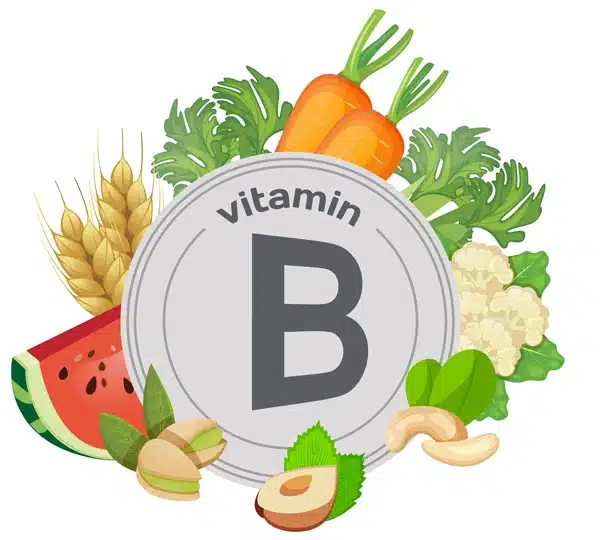
B Vitamins and their Benefits
B1 Thiamine: Needed for carbohydrate, fat and protein metabolism, blood sugar regulation as well as nerve and muscle function.2
B2 Riboflavin: Needed for carbohydrate metabolism, red blood cell growth and development and cellular function.3
B3 Niacin: Converts food into energy, creates and repairs DNA, healthy cholesterol levels, and maintains cognitive function.4
B5 Pantothenic Acid: Especially important for breaking down fats and metabolizing carbohydrates and protein while supporting muscle endurance, nerve function and cognitive function.5
B6 Pyridoxine: Cardiovascular, brain and nerve support as well as protein metabolism.6
B7 Biotin: Converts carbohydrates, fats and proteins into energy and supports skin, hair and nails.7
B9 Folic Acid: Protein metabolism, needed for making DNA and other genetic material for cell replication and important during pregnancy.8
B12 Cobalamin: Protein and fat metabolism, cardiovascular support nerve fiber support, cognitive support, formation of hemoglobin and prevention of anemia.9
The 8 B vitamins work together and are involved in many of the vital functions of the body. Ensuring you are getting adequate amounts of B vitamins daily will enhance overall energy levels and essential vital bodily functions in every stage of life. Cheers to you living with greater energy, vitality and quality of life.
About Paul Bernitt, DHH, Director of Clinical and Wellness Services at TriVita

Paul Bernitt is a Board-Certified Doctor of Holistic Health by the American Naturopathic Medical Certification Board. He is also a Master Herbalist, a Holistic Wellness Practitioner, Doctor of Divinity, and has a degree in Mind-Body Transformational Psychology. Additionally, Paul is certified in Clinical Hypnotherapy, Holistic Nutrition, Bioenergetics, and Life Coaching.
Paul’s mission is to end as much needless suffering as possible by helping people discover hope, health, and healing. He has helped thousands of people experience the value of optimal health and wellness so they can live their purpose with greater energy, vitality, and quality of life mentally, physically, spiritually, emotionally, and environmentally.
References
1. Metabolism of Dietary and Microbial Vitamin B Family in the Regulation of Host Immunity – PubMed (nih.gov)
2. Thiamin – Consumer (nih.gov)
3. Riboflavin – Consumer (nih.gov)
4. Niacin – Consumer (nih.gov)
5. Vitamin B6 – Consumer (nih.gov)
6. Vitamin B6 – Consumer (nih.gov)
7. Biotin – Consumer (nih.gov)
8. Folate – Consumer (nih.gov)
9. VitaminB12-Consumer.pdf (nih.gov), Vitamin B12, cognition, and brain MRI measures | Neurology,
-

Antiviral Benefits of Trans-resveratrol
Resveratrol is a type of natural phenol and a phytoalexin produced by red grapes, peanuts and other plants. Trans-resveratrol is the active ingredient in resveratrol and is widely used in supplements.
Trans-resveratrol is great at multitasking. It can help with heart health, brain health, anti-aging and has antiviral benefits. In recent years, extensive research on resveratrol has been carried out, demonstrating its capacity to prevent a wide variety of conditions, including cardiovascular diseases and cancer, and to control fungal, bacterial and viral infections. Studies suggest that the chemical agent in resveratrol interferes with infection by altering cellular pathways rather than acting directly against the virus itself.
The antiviral effects of resveratrol have been demonstrated in a number of pathogenic human and animal viruses, including influenza, Epstein-Barr and various respiratory viruses. The resveratrol inhibits viral protein synthesis and various transcription and signaling pathways and viral-related gene expressions.
There still are more studies to be done on resveratrol, but evidence gathered so far shows high antiviral potential. Resveratrol has shown to be a potent antiviral molecule against various types of DNA and RNA viruses.
References
-
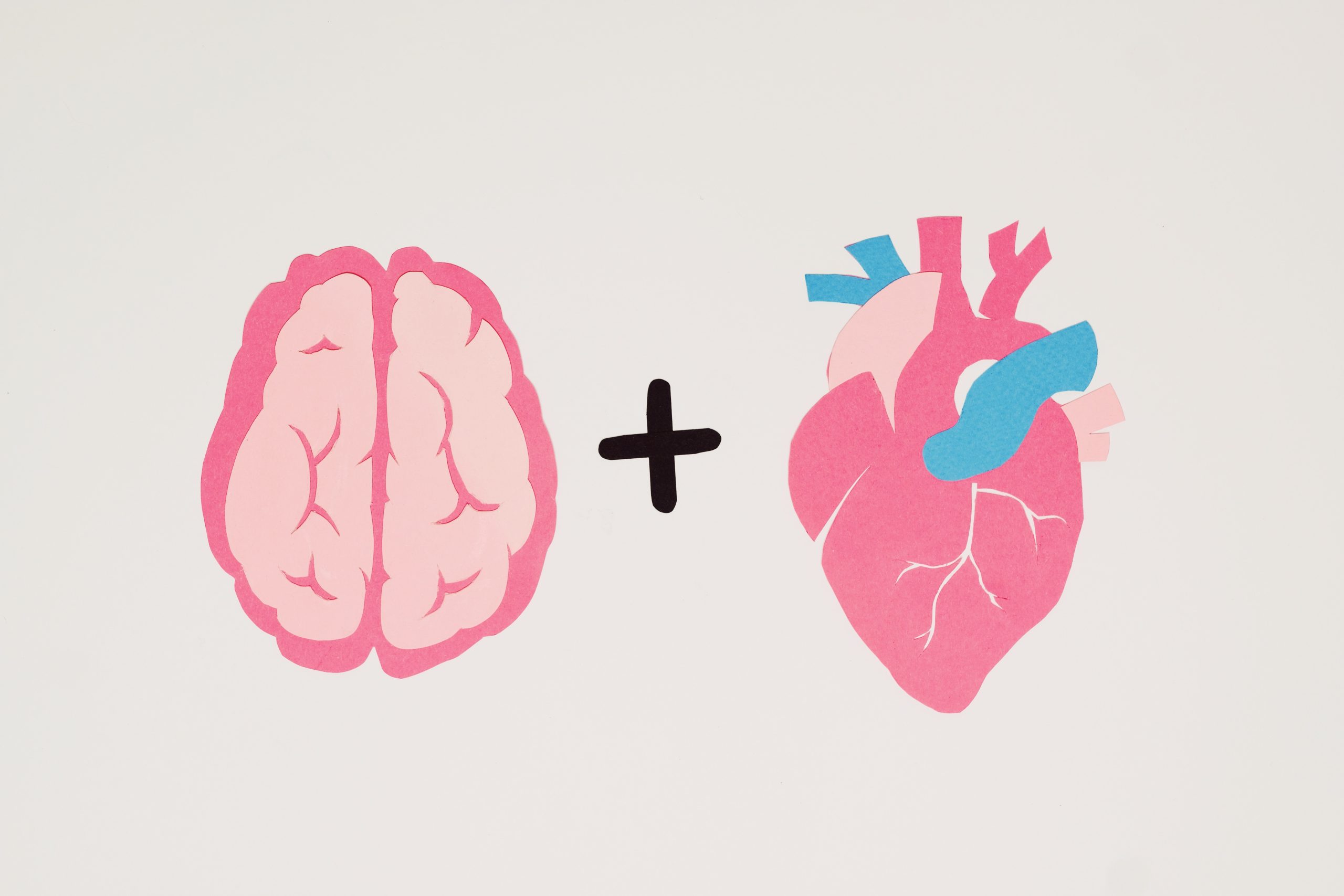
Brain Health & Trans-resveratrol
Growing older is the largest risk factor for neurodegenerative disease, commonly known as brain health. Included in that group is Alzheimer’s, Huntington’s and Parkinson’s diseases along with ALS. Some of these are passed down in our genes, but there are ways to at least slow down the process. The good news is that resveratrol has shown that it may help with this. Resveratrol is a type of natural phenol and a phytoalexin produced by red grapes, peanuts and other plants. Trans-resveratrol is the active ingredient in resveratrol and is widely used in supplements. Both have beneficial effects on the human brain. Clinical trials have demonstrated that resveratrol reduces levels of amyloid-beta in cerebrospinal fluid and improves cognitive function in people with Alzheimer’s disease.

Clinical evidence derived from randomized clinical trials suggests that resveratrol can help with memory loss by improving cerebral blood flow, cerebrospinal fluid level and performance in some cognitive tests.
As the general population grows older, hundreds of millions of people worldwide are affected by neurological disorders. There are many clinical studies dealing with brain health and resveratrol has shown to possess ingredients that can help slow down, and in some cases, prevent neurological disorders, improve memory, as well as slow down the aging process.
Resveratrol may contribute to brain aging reversal by as much as ten years.
References
1. https://pediaa.com/what-is-the-difference-between-resveratrol-and-trans-resveratrol/
2. https://www.ncbi.nlm.nih.gov/pmc/articles/PMC5339301/
3. https://www.ncbi.nlm.nih.gov/pmc/articles/PMC6657254/
4. https://www.nutraingredients.com › Article › 2020/04/08 -

Heart Health & Trans-resveratrol
Heart disease is the leading cause of death in the United States. Heart disease includes various disorders of the heart itself or the blood vessels. It could be coronary artery disease, deep vein thrombosis, congenital heart disease or many others. Heart failure is defined as the inability to pump enough blood to the rest of the body. They all can be classified as a major medical concern and need attention to help slow down the spread or treat the symptoms as best as possible.
Resveratrol is a type of natural phenol and a phytoalexin produced by red grapes, peanuts and other plants. Trans-resveratrol is the active ingredient in resveratrol and is widely used in supplements.
Clinical trials using trans-resveratrol have shown that it may help. Resveratrol could be linked to a lower risk of inflammation and blood clotting, which can lower the risk of heart disease. Resveratrol is also known as a polyphenolic compound and has antioxidant and anti-inflammatory properties. These also help with cardiovascular health. The polyphenols are also present in grapes and red wine, which contributed to the “French Paradox” in the 1990s that found that red wine in moderation may be good for you.
Trans-resveratrol has several beneficial effects and can act at different levels such as cellular signals, enzymatic processes, apoptosis and gene expression. All of these together, along with the ability to flow freely through the bloodstream, have been shown to have positive effects fighting different cardiovascular diseases.

References
https://pediaa.com/what-is-the-difference-between-resveratrol-and-trans-resveratrol/
https://www.ncbi.nlm.nih.gov/pmc/articles/PMC4882663/
https://www.intechopen.com/chapters/62439
-

Episode 53: It’s More than a Life Span…It’s a Health Span
Join Michael and Paul Bernitt, DHH, as they talk about how new science and technology advancements are working to help extend our life span, but question if they are finding ways to optimize our health for that longer life.
How can we extend our “health span” so we can enjoy our life span? Paul, our Director of Clinical & Wellness Services, joins us to share the many benefits of Trans-Resveratrol, TiVita’s newest product. Learn how trans-resveratrol positively affects our metabolic system, helping our cells function more effectively for better heart, brain and immune health as well as an anti-inflammatory.
On this episode of Healthy You, Michael offers other tips to help extend our “health span” so we can enjoy the extra time that science and God are granting us in this modern world.
About Paul Bernitt, DHH, Director of Clinical and Wellness Services at TriVita

Paul Bernitt is a Board-Certified Doctor of Holistic Health by the American Naturopathic Medical Certification Board. He is also a Master Herbalist, a Holistic Wellness Practitioner, Doctor of Divinity, and has a degree in Mind-Body Transformational Psychology. Additionally, Paul is certified in Clinical Hypnotherapy, Holistic Nutrition, Bioenergetics, and Life Coaching.
Paul’s mission is to end as much needless suffering as possible by helping people discover hope, health, and healing. He has helped thousands of people experience the value of optimal health and wellness so they can live their purpose with greater energy, vitality, and quality of life mentally, physically, spiritually, emotionally, and environmentally.
References:
1. https://pubmed.ncbi.nlm.nih.gov/28346848/
2. https://pubmed.ncbi.nlm.nih.gov/22240353/
3. https://www.nature.com/articles/s41698-017-0038-6 -

Episode 52: Understanding the Dangers of Chronic Inflammation
In his latest podcast, Michael shares information about chronic inflammatory health conditions, which are the world’s #1 health risk, and how we can protect ourselves against them.
Learn about a study published by Harvard Medical School that talks about how to stop the damage of inflammation before it compromises your health. The good news is that we all can do something about chronic inflammation.
Growing evidence indicates that lifestyle choices may be the biggest factor in most of the leading diseases, not your genes. Are you aware of your thymus gland? It is critical to your immunity. You are not powerless. Learn how to practice self-care and get vested in your health. It will pay dividends.
On this episode of Healthy You, join Michael as he shares information about chronic inflammatory health conditions and how you can protect yourself against them.About Michael R. Ellison, TriVita Founder & CEO

Michael Ellison has a mission to help people everywhere experience whole-person wellness. For him, this mission became crystal clear when he suffered a health crisis at the age of 50.
As Michael recovered and found his way back to health, he became determined to share his message of wellness with others. This led to his founding of TriVita in 1999, where he now leads the company’s ongoing pursuit of bringing health and wellness to the world.
Helping people experience greater wellness and mitigate the unwanted, unnecessary lifestyle-related diseases continue to be Michael’s purpose… and he brings this passion to the table in the day-to-day operations at TriVita.
Michael Ellison is also the author of 10 Habits of Wellness and founder of House of Giving — a nonprofit organization focused on serving those less fortunate, especially children in poverty-stricken areas of the world by providing opportunities for a higher quality of life and wellness.
-
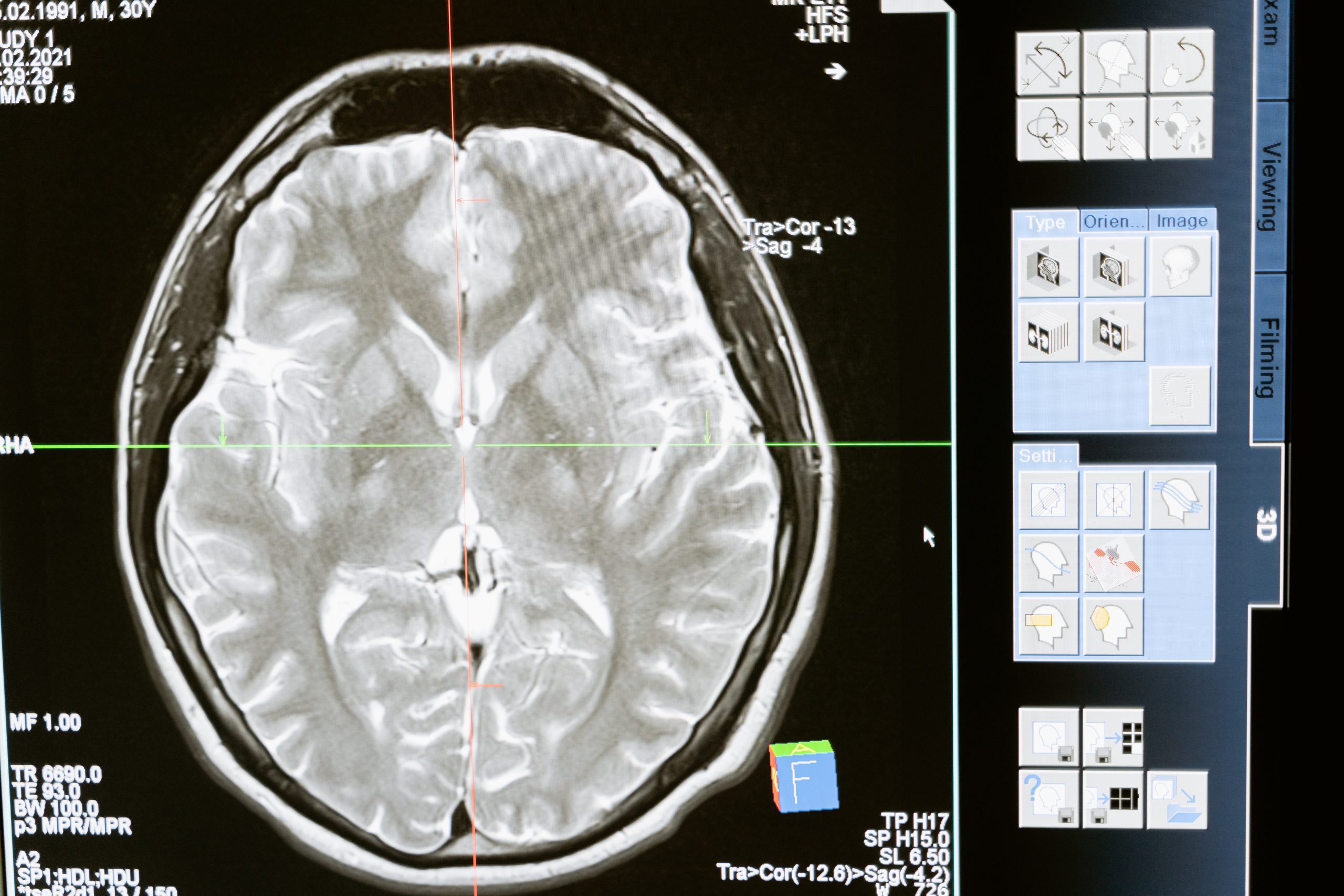
How to Improve Brain “Fitness”
By Sandra Bond Chapman, Ph.D. We know the physical changes that aging brings: graying hair, wrinkles and a tendency to gain weight. Less well understood, but more important to our ability to live long, healthy lives, are age-related changes in our brains. According to a recent survey by AARP (American Association of Retired Persons), staying mentally sharp is important to 93% of Americans, but few know how to maintain or improve brain health. Until recently, cognitive (brain function) losses in healthy adults were viewed as an inevitable consequence of living longer. Since our life expectancy has increased steadily over the years, this caused alarm. Scientific research shows that cognitive aging is a natural pro cess that affects everyone, to varying degrees, with both positive and negative effects. But here is the good news: each of us has the ability to strengthen our brain function throughout our lives, and to prevent, slow or even reverse cognitive decline. That is, if we take the right steps, eliminate toxic routines and adopt healthy habits. For thousands of years, people have searched in vain for the Fountain of Youth to stay young. However, science is pointing the way to a different approach, which is to embrace the continued potential of our aging mind. We have tremendous power to strengthen and heal our brain’s health throughout life. Without brain health, we simply do not have health.
9 WAYS TO STAY SHARP
Whatever your stage in life, use these brain-healthy habits to strengthen brain systems and enhance brain “fitness”:
Get a good night’s sleep
Eight hours is optimal. It allows us to reset an exhausted brain engine, to consolidate learning of new information at higher levels of understanding and to derive “aha” moments. These “ahas” happen when we connect ideas in newer, more innovative ways.
Slow down to succeed
Working constantly without taking time to step back and reflect on actions hinders productivity and performance along with increasing stress. While it seems counterintuitive to increase mental energy by slowing the pace, try it; it works. Give weighty decisions and projects the time, reflection and contemplation they need.
Block out
Consciously filter extraneous information to focus on the task at hand. This technique has not only been shown to impact cognitive health but is also a sign of higher intellectual function. It may come as a surprise, but our current daily lifestyle habits—even some we believe are good for our brain such as the myth of multitasking—are toxic to good brain health.
Think at a deeper level
Instead of being bogged down in minute details, give information new meaning by absorbing it and relating it to your own experiences. Achieving a new perspective will inspire your brain to generate new ideas and solutions.
Enjoy aerobic physical activity
Exercise is one of the most important ways to increase blood flow to the areas of the brain crucial to memory and attention. In a recent study, our researchers at the Center for BrainHealth found that an hour of aerobic exercise three times a week significantly improved memory function of adults ages 57-75 within 12 weeks.
Eat right
Fill your plate with vegetables, fruit, nuts, fish, legumes and olive oil. Go easy with red meat, dairy products and sweets. This diet balance reduces disease of the blood vessels and arteries, which is a major contributing factor to dementia and mental decline. Deficiencies of the nutrients from a healthy diet can impair brain function and long-term brain health.
Manage medications effectively
Some medications—including certain anxiety or sleep drugs and antihistamines—can lead to mental fogginess. Regularly discuss and review medications that may affect brain function with your healthcare provider.
Reduce cardiovascular disease risk factors
Your heart and your brain are uniquely intertwined. Be sure to control high blood pressure and diabetes and stop smoking.
Connect socially
Social networks are positively related to higher cognitive performance. This article is intended for educational purposes only.
References:
http://www.aarp.org/about-aarp/press-center/info-01-2015/staying-sharp-brain-health-survey.html
http://journal.frontiersin.org/article/10.3389/fnagi.2013.00075/abstract
-

Gut Health: The Key To a Healthy Life
Modern medicine is learning what many traditional cultures knew all along—a healthy gut is critical for a healthy body.
There are two principal reasons for this—nutrients and immune health. Without the ability to process and assimilate key nutrients into the body, everything from brain function to muscle integrity suffers. A healthy gut digests everything we take in and grants access to these vital nutrients, which impact every cell in the body. Less obvious but equally critical is the role the gut plays in regulating the immune system and identifying friend from foe.
The digestive process is a bit of a mystery to most people. We know what goes in and what comes out—it’s what happens in between that turns everything from leaves of lettuce to bites of meat into fuel and essential building blocks for our bodies where many of us lack some details. The digestive system has five main functions: (1) breaking down food into usable nutrients; (2) absorbing nutrients; (3) keeping out invaders and identifying friend from foe; (4) regulating the immune system; and (5) eliminating waste.
Modern medicine is learning what many traditional cultures knew all along—a healthy gut is critical for a healthy body.
The process begins in the mouth with chewing, an under-appreciated part of digestion, which breaks food down into smaller pieces that would otherwise have to be broken down by chemical processes alone. Chewing also moistens and mixes the food with saliva. The first chemical breakdown of food also occurs in the mouth thanks to salivary amylase, an enzyme that begins breaking down carbohydrates.
Afterwards , food in the mouth is swallowed and travels down the esophagus to the stomach.The body requires both macro and micronutrients. There are three main types of macronutrients—carbohydrates, fats and proteins. “Carbs” come in simple forms such as sugars as well as complex forms, which are basically chains of sugars. Foods like rice, bread, potatoes and pasta are rapidly broken down to sugar and tend to spike blood sugar levels relatively quickly. Foods with more complex forms of carbohydrates, including most vegetables, are broken down more slowly and tend not to raise blood sugar very much. Still other carbohydrates cannot be broken down by our body and may pass through the upper part of the digestive system and into the colon, where they serve as food and fuel for the microbes living there.
The other two main macronutrients also serve key functions. A substantial portion of the human body consists of protein, and amino acids serve as the building blocks of protein to enhance our bodily functions and make muscle. Fats are equally important. They are the most dense source of calories for the body, yielding 9 calories/gram compared to 4 calories/gram for protein and carbohydrates; they serve as reservoirs of energy storage for the body and as the key components of our cell membranes. They are also critical for maintaining cell structural integrity.

Once food reaches the stomach, it’s mixed with fluids and stomach acid. Stomach acid is in actuality hydrochloric acid, a strong chemical acid, but thanks to mucus and a specialized lining, the stomach remains protected, enabling it to serve as a holding tank that regulates the delivery of food to the intestines. Acid is vitally important to the breakdown of food, especially proteins, which are broken into smaller fragments that can be further digested in the intestines.
Two other vital organs that feed into the upper intestines and perform critical digestive functions are the liver and the pancreas. As the metabolic powerhouse of the body, the liver produces many important proteins and detoxifies chemicals and hormones and excretes them into the bile. Bile is concentrated in the gallbladder, which pumps it into the intestine when stimulated by food. Bile allows the liver to rid the body of toxins and metabolic waste products and helps with the digestion of fats through emulsification, making them more soluble.
The pancreas plays a central role in both digestion and regulating metabolism through the production and secretion of insulin, along with other hormone-like molecules. The pancreatic fluids secreted into the intestines contain three different types of digestive enzymes—proteases, lipases and amylases. Proteases break down protein into smaller pieces and eventually into amino acids. Lipases break down fats into fatty acids and amylase breaks down starch into sugars. As such, it’s easy to assess the importance of digestive enzymes. However, disease and the aging process can limit production. When this happens, it can prove beneficial to add enzyme supplements to your diet on a regular basis.
Food from the stomach is fed into the small intestine, where the majority of nutrients are absorbed. It consists of three parts—in digestive order the duodenum, the jejunum and the ileum. The small intestines have many folds and are covered with multiple projections, called villi, which in turn are covered with microvilli that further increase the surface area to over 400 square feet.
Adequate breakdown of food and the health and integrity of the intestinal lining are both key to preserving health. In a healthy gut the lining is protected by intact membranes that form a tight seal to keep anything from seeping between the cells into the bloodstream. But a damaged or leaky lining allows protein fragments and other molecules that would normally remain in the gut to pass through and enter the bloodstream. And if the proteins, carbohydrates and fats are not fully broken down by stomach acid and enzymes before entering the bloodstream, the situation becomes even worse.
When digestion is incomplete due to a lack of stomach acid, deficiencies in digestive enzymes and insufficient bile or a microbiome that is out of balance, larger particles may get into the bloodstream.
Once these larger molecules that normally stay inside the gut reach the bloodstream, the immune system identifies them as foreign invaders and attacks by targeting antibodies and different types of immune cells against them. When the problem of incomplete digestion causes symptoms in the gastrointestinal (GI) tract itself, bloating, diarrhea, constipation or abdominal pain may occur. And when these fragments travel throughout the bloodstream, autoimmune problems such as certain types of arthritis or even thyroid problem issues occur.
Where Do Healthy Bacteria In The Gut Come From?
Babies are born without any bacteria in their gut; those born vaginally develop a wider variety of healthy normal bacteria sooner than babies born by Cesarean Section as the trip through the birth canal inoculates them with healthy bacteria from the mother. While the full adult microbiome does not usually get established until around age 4, children who have siblings, grow up with a dog, go to daycare and play outdoors are less likely to have certain types of health problems (such as asthma) and tend to have more complete and healthier microbiomes.
What Can Go Wrong?
Troubles with the GI system can occur anywhere along the way. Dry mouth and insufficient chewing can lead to swallowing problems, as well as issues breaking down food, since the body depends on the mechanical crushing action of chewing to increase the surface area of food and, in turn, to give the stomach acid, bile and enzymes a chance to act on that food.
If you have eaten a wide variety of live foods throughout your life and rarely if ever taken antibiotics, you may have a diverse and healthy population of bacteria in your system. However, the diversity of the microbiome may decrease as you age, leading to the theory that this may be an important factor in the development of different diseases and a loss of resilience with age. If you have taken antibiotics during your life, your gut bacteria may be even less complete. In these circumstances taking a probiotic supplement on a regular basis may enhance your overall health.
GERD – Acid Reflux

Food passes from the esophagus into the stomach through the LES (Lower Esophageal Sphincter) which acts like a valve, letting food into the stomach and preventing it from reentering the esophagus. However, when the LES fails to do its job, acid from the stomach or bile can back up into the esophagus, damaging the esophageal tissue and potentially causing burning pain or scarring.
Reversible factors that can cause or worsen Gerd:
- Caffeine
- Tobacco
- Alcohol
- Mint or Peppermint
- Obesity
- Certain Medications
Stomach Problems

Stomach problems stem from three main causes: infections with the bacteria Helicobacter pylori, medications and substances that damage the lining of the stomach and form substances that increase stomach acid. Mild to moderate stomach problems result in gastritis, damage to the surface of the stomach lining, while more serious problems result in ulceration. Stomach ulcers can form deep holes in the stomach lining and cause serious bleeding or even perforation. Helicobacter pylori infections can be identified with blood, stool or breath tests. The infection can be eliminated with a combination of antibiotics and other stomach medicines. Treating Helicobacter infections greatly increases the chance of healing the ulcer and helps to prevent recurrence.
Factors That Cause Stomach Ulcers:
Agent: Helicobacter Pylori Infection
Mechanism: Infiltrates stomach liningAgent: Aspirin/NSAID Medications
Mechanism: Directly damage stomach liningAgent: Alcohol
Mechanism: Directly damage stomach liningAgent: Caffeine
Mechanism: Increase stomach acid outputAgent: Tobacco
Mechanism: Increase stomach acid outputAchlorhydria – Problems With Too Little Stomach Acid
Insufficient stomach acid can also cause problems. Stomach acid helps break down food and to form a first line of defense against many organisms we ingest. Insufficient stomach acid, known as achlorhydria, not only results in poor digestion; it is also associated with lower absorption rates of certain nutrients such as calcium and with a condition called Pernicious Anemia, which occurs when intrinsic factor, an element produced in the stomach essential for the absorption of Vitamin B-12 production, is not made. This results in a severe Vitamin B-12 deficiency that can cause anemia, nerve damage and even cognitive decline.
Intestinal Problems
Digestion difficulties in the intestines can involve the small or the large bowel. The large bowel is called the colon. Celiac Disease is an autoimmune disorder involving the destruction of the lining of the first portion of the small bowel, which results from a reaction to gluten. In Celiac and many diseases that affect the bowel, the villi and microvilli are destroyed, leading to a loss of the ability to absorb nutrients. When this happens a variety of secondary problems can occur throughout the body due to a lack of these nutrients.
A healthy population of bacteria in the intestines is also critical for digestion, as these bacteria produce substances that nourish the cells that line the gut along with certain vitamins and other nutrients. If your microbiome (the organisms within your gut) is out of balance or declines in quality with age, probiotic supplements can be of value. In addition to a healthy population of bacteria, it’s also vital to have the right food to fuel them. Certain fibers can serve as prebiotics to fulfill this function. However, if your diet is lacking in healthy fibers, taking prebiotic supplements along with probiotics may improve the health and quality of your microbiome.
One of the most common bowel conditions is irritable bowel syndrome (IBS), which can cause pain, diarrhea and constipation. Stress plays a significant role in the communication between the nervous system and the bowel, and disorders such as IBS may improve with effective stress management techniques. Inflammatory bowel diseases (IBD) are more serious bowel disorders that can result in damage to the lining of large sections of the intestines and can lead to serious bleeding, obstruction and perforation. Diseases such as Crohn’s Disease and Ulcerative Colitis are inflammatory bowel diseases.
Functional Medicine Approach to Health the Gut
Functional Medicine uses an approach called 5R to heal the gut. 5R stands for:
Remove, Replace, Repopulate, Repair and Rebalance.
Different versions of this approach can be used to treat a variety of problems throughout the gut. Functional Medicine practitioners believe that treating gut problems is a critical element in healing not only GI problems but also a wide variety of problems throughout the body.
Remove

Removing refers to eliminating both pathogenic organisms such as parasites or excessive yeast as well as medicines or chemicals that damage either the gut itself or the health of the gut bacteria—the microbiome. Removing toxic chemicals and medicines primarily involves avoiding them to the extent possible. Sometimes special programs or supplements are used to help the body eliminate toxins.
Replace
Replace in the 5R treatment approach refers to replacing elements that may be missing such as stomach acid or digestive enzymes. It could also include replacing important elements missing in the diet such as vegetables or grains, which include prebiotic fibers that nourish and serve as food to maintain a healthy and diverse microbiome. If you aren’t getting enough beneficial ingredients from dietary sources, taking a prebiotic supplement may be of value.
Repopulate
Repopulate refers to reseeding the gut with healthy microbes. In the early 1900s, pioneering researcher Eli Metchnikoff puzzled over why certain people in the mountains of Bulgaria lived considerably longer than others. He found that these healthy mountain villagers were regularly drinking fermented yogurt, which contained a probiotic species that was a type of Lactobacillus. It clearly seemed to improve their health and also may have extended their lives. Based on Metchnikoff’s work, over the years others have done further work to enhance understanding. Modern research has shown that different beneficial bacteria have different positive effects in the body. These range from improving the symptoms of irritable bowel syndrome to lowering cholesterol and anxiety. These can come in foods like fermented yogurt, live foods such as sauerkraut and kimchee or from specific probiotic supplements. The most effective way to change the population of microbes in the colon is fecal microbial transplant [FMT], or stool transplant. When successful, this seems to result in a more significant and sustainable change in the microbial population. Fecal transplant is most commonly used for patients who have recurrent life-threatening colon infections with the bacteria Clostridium difficile, although a number of other conditions may also benefit.
Foods that may have prebiotic effects:

Asparagus, garlic, leeks, legumes, oats,
sea weed , onion, bananas, dandelion greens, barley, wheat bran, Jicama root, Jerusalem artichokesand artichokes.Repair
The Repair in the 5R approach refers to supplying important nutrients that help to improve the health of the cells lining the gut. This includes giving substances that can sustain and nourish the cells that line the stomach and intestines such as the amino acid glutamine as well as micronutrients like zinc, along with a spectrum of vitamins. When the stage has been set by removing harmful elements and repopulating the gut with healthy microbes, these healthy substances can help heal the lining of the intestines and make it less likely to be a leaky gut. This in turn can lead to improvements in health throughout the body.
Rebalance
Rebalance is the final phase of improving gut health. If the body is under sustained chronic stress, cortisol and other hormones change the environment in the bowel. This makes it more favorable for the unhealthy bacteria and less favorable for healthy species of bacteria and other microbes. Stress management, counseling and mind-body work such as MBSR (Mindfulness Based Stress Reduction), T’ai Chi and Yoga can help rebalance the autonomic nervous system and allow the body to develop a healthier level of gastrointestinal function.
5R Gut Healing Table – Examples
REMOVE
Agents to Change:
Remove gluten in Celiac Disease and other sensitive individuals; remove harmful parasites, excessive yeastand harmful bacteria species; remove toxic chemicals and unhelpful medicationsREPLACE
Agents to Change:
Stomach acid replacement; digestive enzyme replacement; bile salt replacement when deficient; providing prebiotic fiberProducts and Approaches of Value:
Digestive enzyme supplements; prebiotic dietary fibers; prebiotic supplementsREPOPULATE
Agents to Change:
Replace healthy microbesProducts and Approaches of Value:
Live foods such as live culture yogurt and sauerkraut; probiotic supplementsREPAIR
Agents to Change:
Provide essential compounds for the health of gut cellsProducts and Approaches of Value:
ZincREBALANCE
Agents to Change:
Stress reduction techniquesProducts and Approaches of Value:
T’ai Chi program; healing prayerConclusion
Understanding that gut health is a key factor in your overall health is an important step. It also helps to unravel numerous issues that arise at different stages of digestion. By understanding each step and what can go wrong, we can take measures to preserve and restore the health of the entire GI system. A Functional Medicine approach relies on a deep understanding of what promotes health and what it takes to nourish and heal the gut to promote system wide health. The combination of a healthy gut and a healthy diet can allow us to optimize our nutrition, which can contribute to optimal health in tissues throughout the body. While it’s obvious that gut health relates to issues of the digestive organs, less obvious but equally important is understanding the role a healthy gut plays in issues as diverse as the regulation of the immune system and the health of the brain.
To download a printable PDF copy of this special report, click the button below:
About Robert Sheeler, M.D.

Dr. Robert Sheeler is a Family Physician who spent a substantial part of his career at Mayo Clinic. During that time he served as the Medical Editor for the Mayo Clinic Health Letter, taught and developed curriculum in the medical school and chaired the NeuroPsychiatric Medicine group. In addition to Family Medicine, he is also certified in Functional Medicine through the Institute for Functional Medicine and as a sub-specialist in Headache Medicine through the United Council of Neurologic Sub-specialists. Dr. Sheeler is Board Certified in Urgent Care, Holistic-Integrative Medicine and Integrative Medicine as well. He has strong interests in nutrition, cooking, stress management
and lifestyle medicine and also practices and teaches Taiji [T’ai Chi] and Qigong.DR. SHEELER’S PERSONAL PHILOSOPHY
I believe that a balanced lifestyle and a diet rich in healthy anti-inflammatory natural foods can be of significant value in preserving and restoring health. Natural products often make more sense than pharmaceuticals, as they seem to alter biochemical pathways more gently rather than turning off whole systems our body naturally utilize.
A diet that contains diverse types of vegetables along with some fruits is often best to promote a diverse and healthy population of gut microorganisms. I try to eat 2 servings of fruit a day—usually fruits that do not raise blood sugar as much such as berries and apples and 5 servings of different types of vegetables a day along with healthy proteins and healthy types of fats such as olive oil, especially EVOO, avocado oil and coconut oil.
Beyond eating right, exercising and getting adequate sleep, I believe that meaningful relationships, community and spiritual connection are also of great value.
-

Episode 51: We CAN Change The Way We Respond to Life!
In this timely message, Michael shares inspirational information from an email from Jack Canfield and an exercise you can do that will change the way you feel emotionally, physically and spiritually.
In the past couple of years, we’ve all had feelings like we’re losing control. The messaging in the world of media makes feeling good a challenge. It’s okay to feel frustrated and overwhelmed for a moment, but we can choose a different response.
What you think is what you feel. You can’t feel anger and gratitude simultaneously, so choose gratitude. Be self-compassionate. You CAN change the way we respond to life. God’s promises to us have not changed.
On this episode of Healthy You, join Michael as he shares an email from Jack Canfield, author of Chicken Soup For The Soul, with a message affirming the power we all have available!
About Michael R. Ellison, TriVita Founder & CEO

Michael Ellison has a mission to help people everywhere experience whole-person wellness. For him, this mission became crystal clear when he suffered a health crisis at the age of 50.
As Michael recovered and found his way back to health, he became determined to share his message of wellness with others. This led to his founding of TriVita in 1999, where he now leads the company’s ongoing pursuit of bringing health and wellness to the world.
Helping people experience greater wellness and mitigate the unwanted, unnecessary lifestyle-related diseases continue to be Michael’s purpose… and he brings this passion to the table in the day-to-day operations at TriVita.
Michael Ellison is also the author of 10 Habits of Wellness and founder of House of Giving — a nonprofit organization focused on serving those less fortunate, especially children in poverty-stricken areas of the world by providing opportunities for a higher quality of life and wellness.